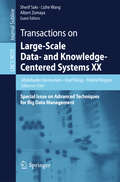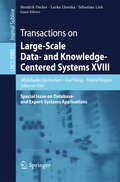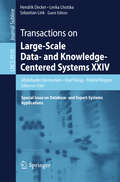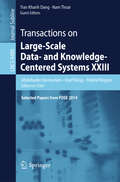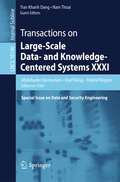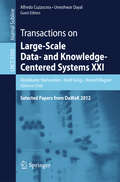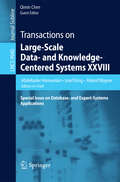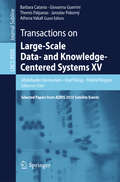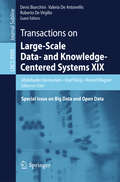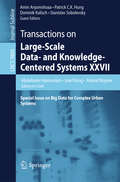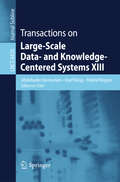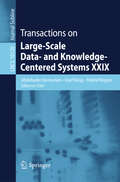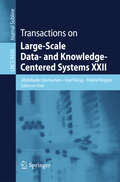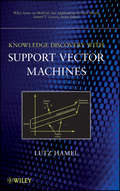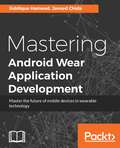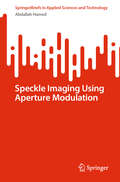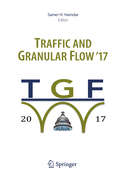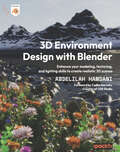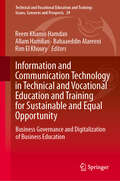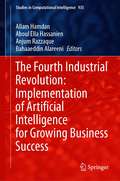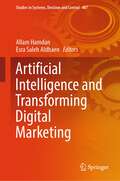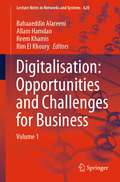- Table View
- List View
Transactions on Large-Scale Data- and Knowledge-Centered Systems XX
by Abdelkader Hameurlain Josef Küng Roland Wagner Sherif Sakr Lizhe Wang Albert ZomayaThe LNCS journal Transactions on Large-Scale Data- and Knowledge-Centered Systems focuses on data management, knowledge discovery, and knowledge processing, which are core and hot topics in computer science. Since the 1990s, the Internet has become the main driving force behind application development in all domains. An increase in the demand for resource sharing across different sites connected through networks has led to an evolution of data- and knowledge-management systems from centralized systems to decentralized systems enabling large-scale distributed applications providing high scalability. Current decentralized systems still focus on data and knowledge as their main resource. Feasibility of these systems relies basically on P2P (peer-to-peer) techniques and the support of agent systems with scaling and decentralized control. Synergy between grids, P2P systems, and agent technologies is the key to data- and knowledge-centered systems in large-scale environments. This, the 20th issue of Transactions on Large-Scale Data- and Knowledge-Centered Systems, presents a representative and useful selection of articles covering a wide range of important topics in the domain of advanced techniques for big data management. Big data has become a popular term, used to describe the exponential growth and availability of data. The recent radical expansion and integration of computation, networking, digital devices, and data storage has provided a robust platform for the explosion in big data, as well as being the means by which big data are generated, processed, shared, and analyzed. In general, data are only useful if meaning and value can be extracted from them. Big data discovery enables data scientists and other analysts to uncover patterns and correlations through analysis of large volumes of data of diverse types. Insights gleaned from big data discovery can provide businesses with significant competitive advantages, leading to more successful marketing campaigns, decreased customer churn, and reduced loss from fraud. In practice, the growing demand for large-scale data processing and data analysis applications has spurred the development of novel solutions from both industry and academia.
Transactions on Large-Scale Data- and Knowledge-Centered Systems XVIII
by Abdelkader Hameurlain Josef Küng Roland Wagner Hendrik Decker Lenka Lhotska Sebastian LinkThe LNCS journal Transactions on Large-Scale Data- and Knowledge-Centered Systems focuses on data management, knowledge discovery, and knowledge processing, which are core and hot topics in computer science. Since the 1990s, the Internet has become the main driving force behind application development in all domains. An increase in the demand for resource sharing across different sites connected through networks has led to an evolution of data- and knowledge-management systems from centralized systems to decentralized systems enabling large-scale distributed applications providing high scalability. Current decentralized systems still focus on data and knowledge as their main resource. Feasibility of these systems relies basically on P2P (peer-to-peer) techniques and the support of agent systems with scaling and decentralized control. Synergy between grids, P2P systems, and agent technologies is the key to data- and knowledge-centered systems in large-scale environments. This, the 18th issue of Transactions on Large-Scale Data- and Knowledge-Centered Systems, contains extended and revised versions of seven papers presented at the 24th International Conference on Database and Expert Systems Applications, DEXA 2013, held in Prague, in the Czech Republic, in August 2013. Following the conference, and two further rounds of reviewing and selection, five extended papers and two invited keynote papers were chosen for inclusion in this special issue. The subject areas covered include argumentation, e-government, business processes, predictive traffic estimation, semantic model integration, top-k query processing, uncertainty handling, graph comparison, community detection, genetic programming, and web services.
Transactions on Large-Scale Data- and Knowledge-Centered Systems XXIV
by Abdelkader Hameurlain Josef Küng Roland Wagner Hendrik Decker Lenka Lhotska Sebastian LinkThis, the24th issue of Transactions on Large-Scale Data- and Knowledge-Centered Systems,contains extended and revised versions of seven papers presented at the 25thInternational Conference on Database and Expert Systems Applications, DEXA2014, held in Munich, Germany, in September 2014. Following the conference, andtwo further rounds of reviewing and selection, six extended papers and oneinvited keynote paper were chosen for inclusion in this special issue. Topicscovered include systems modeling, similarity search, bioinformatics, datapricing, k-nearest neighbor querying, database replication, and dataanonymization.
Transactions on Large-Scale Data- and Knowledge-Centered Systems XXIII
by Abdelkader Hameurlain Josef Küng Roland Wagner Tran Khanh Dang Nam ThoaiThis volume, the 23rd issue of Transactions on Large-Scale Data- and Knowledge-Centered Systems,focuses on information and security engineering. It contains five revised and extended papers selected from the proceedings of the First International Conference on Future Data and Security Engineering, FDSE 2014, held in Ho Chi Minh City, Vietnam, November 19-21, 2014. The titles of the five papers are as follows: A Natural Language Processing Tool for White Collar Crime Investigation; Data Leakage Analysis of the Hibernate Query Language on a Propositional Formulae Domain; An Adaptive Similarity Search in Massive Datasets; Semantic Attack on anonymized Transactions; and Private Indexes for Mixed Encrypted Databases.
Transactions on Large-Scale Data- and Knowledge-Centered Systems XXXI
by Abdelkader Hameurlain Josef Küng Roland Wagner Tran Khanh Dang Nam ThoaiThe LNCS journal Transactions on Large-Scale Data- and Knowledge-Centered Systems focuses on data management, knowledge discovery, and knowledge processing, which are core and hot topics in computer science. Since the 1990s, the Internet has become the main driving force behind application development in all domains. An increase in the demand for resource sharing across different sites connected through networks has led to an evolution of data- and knowledge-management systems from centralized systems to decentralized systems enabling large-scale distributed applications providing high scalability. Current decentralized systems still focus on data and knowledge as their main resource. Feasibility of these systems relies basically on P2P (peer-to-peer) techniques and the support of agent systems with scaling and decentralized control. Synergy between grids, P2P systems, and agent technologies is the key to data- and knowledge-centered systems in large-scale environments. This, the 31st issue of Transactions on Large-Scale Data- and Knowledge-Centered Systems, contains six revised selected papers from the 2nd International Conference on Future Data and Security Engineering, FDSE 2015, and the 9th International Conference on Advanced Computing and Applications, ACOMP 2015, which were held in Ho Chi Minh City, Vietnam, in November 2015. Topics covered include big data analytics, data models and languages, security and privacy, complex business services, and cloud data management.
Transactions on Large-Scale Data- and Knowledge-Centered Systems XXI
by Abdelkader Hameurlain Josef Küng Roland Wagner Alfredo Cuzzocrea Umeshwar DayalThe LNCS journal Transactions on Large-Scale Data- and Knowledge-Centered Systems focuses on data management, knowledge discovery, and knowledge processing, which are core and hot topics in computer science. Since the 1990s, the Internet has become the main driving force behind application development in all domains. An increase in the demand for resource sharing across different sites connected through networks has led to an evolution of data- and knowledge-management systems from centralized systems to decentralized systems enabling large-scale distributed applications providing high scalability. Current decentralized systems still focus on data and knowledge as their main resource. Feasibility of these systems relies basically on P2P (peer-to-peer) techniques and the support of agent systems with scaling and decentralized control. Synergy between grids, P2P systems, and agent technologies is the key to data- and knowledge-centered systems in large-scale environments. This volume, the 21st issue of Transactions on Large-Scale Data- and Knowledge-Centered Systems, focuses on Data Warehousing and Knowledge Discovery from Big Data, and contains extended and revised versions of eight papers selected as the best papers from the 14th International Conference on Data Warehousing and Knowledge Discovery (DaWaK 2012), held in Vienna, Austria, during September 3-6, 2012. These papers cover several advanced Big Data topics, ranging from data cube computation using MapReduce to multiple aggregations over multidimensional databases, from data warehousing systems over complex energy data to OLAP-based prediction models, from extended query engines for continuous stream analytics to popular pattern mining, and from rare pattern mining to enhanced knowledge discovery from large cross-document corpora.
Transactions on Large-Scale Data- and Knowledge-Centered Systems XXVIII
by Abdelkader Hameurlain Josef Küng Roland Wagner Qimin ChenThis, the 28th issue of Transactions on Large-Scale Data- and Knowledge-Centered Systems, contains extended and revised versions of six papers presented at the 26th International Conference on Database- and Expert-Systems Applications, DEXA 2015, held in Valencia, Spain, in September 2015. Topics covered include efficient graph processing, machine learning on big data, multistore big data integration, ontology matching, and the optimization of histograms for the Semantic Web.
Transactions on Large-Scale Data- and Knowledge-Centered Systems XV
by Abdelkader Hameurlain Josef Küng Roland Wagner Barbara Catania Giovanna Guerrini Themis Palpanas Jaroslav Pokorný Athena VakaliThe LNCS journal Transactions on Large-Scale Data- and Knowledge-Centered Systems focuses on data management, knowledge discovery, and knowledge processing, which are core and hot topics in computer science. Since the 1990s, the Internet has become the main driving force behind application development in all domains. An increase in the demand for resource sharing across different sites connected through networks has led to an evolution of data- and knowledge-management systems from centralized systems to decentralized systems enabling large-scale distributed applications providing high scalability. Current decentralized systems still focus on data and knowledge as their main resource. Feasibility of these systems relies basically on P2P (peer-to-peer) techniques and the support of agent systems with scaling and decentralized control. Synergy between grids, P2P systems, and agent technologies is the key to data- and knowledge-centered systems in large-scale environments. This special issue contains extended and revised versions of 4 papers, selected from the 25 papers presented at the satellite events associated with the 17th East-European Conference on Advances in Databases and Information Systems (ADBIS 2013), held on September 1-4, 2013 in Genoa, Italy. The three satellite events were GID 2013, the Second International Workshop on GPUs in Databases; SoBI 2013, the First International Workshop on Social Business Intelligence: Integrating Social Content in Decision Making; and OAIS 2013, the Second International Workshop on Ontologies Meet Advanced Information Systems. The papers cover various topics in large-scale data and knowledge-centered systems, including GPU-accelerated database systems and GPU-based compression for large time series databases, design of parallel data warehouses, and schema matching. The special issue content, which combines both theoretical and application-based contributions, gives a useful overview of some of the current trends in large-scale data and knowledge management and will stimulate new ideas for further research and development within both the scientific and industrial communities.
Transactions on Large-Scale Data- and Knowledge-Centered Systems XIX
by Abdelkader Hameurlain Josef Küng Roland Wagner Devis Bianchini Valeria De Antonellis Roberto De VirgilioThe LNCS journal Transactions on Large-Scale Data- and Knowledge-Centered Systems focuses on data management, knowledge discovery, and knowledge processing, which are core and hot topics in computer science. Since the 1990s, the Internet has become the main driving force behind application development in all domains. An increase in the demand for resource sharing across different sites connected through networks has led to an evolution of data- and knowledge-management systems from centralized systems to decentralized systems enabling large-scale distributed applications providing high scalability. Current decentralized systems still focus on data and knowledge as their main resource. Feasibility of these systems relies basically on P2P (peer-to-peer) techniques and the support of agent systems with scaling and decentralized control. Synergy between grids, P2P systems, and agent technologies is the key to data- and knowledge-centered systems in large-scale environments. This, the 19th issue of Transactions on Large-Scale Data- and Knowledge-Centered Systems, contains four high-quality papers investigating the areas of linked data and big data from a data management perspective. Two of the four papers focus on the application of clustering techniques in performing inference and search over (linked) data sources. One paper leverages graph analysis techniques to enable application-level integration of institutional data and a final paper describes an approach for protecting users' profile data from disclosure, tampering, and improper use.
Transactions on Large-Scale Data- and Knowledge-Centered Systems XXVII
by Abdelkader Hameurlain Josef Küng Roland Wagner Amin Anjomshoaa Patrick C. K. Hung Dominik Kalisch Stanislav SobolevskyThis, the 27th issue of Transactions on Large-Scale Data- and Knowledge-Centered Systems, contains extended and revised versions of 12 papers presented at the Big Data and Technology for Complex Urban Systems symposium, held in Kauai, HI, USA in January 2016. The papers explore the use of big data in complex urban systems in the areas of politics, society, commerce, tax, and emergency management.
Transactions on Large-Scale Data- and Knowledge-Centered Systems XIII
by Abdelkader Hameurlain Josef Küng Roland WagnerThis, the 13th issue of Transactions on Large-Scale Data and Knowledge-Centered Systems, contains six revised selected regular papers. Topics covered include federated data sources, information filtering, web data clouding, query reformulation, package skyline queries and SPARQL query processing over a LaV (Local-as-View) integration system.
Transactions on Large-Scale Data- and Knowledge-Centered Systems XXIX
by Abdelkader Hameurlain Josef Küng Roland WagnerThe LNCS journal Transactions on Large-Scale Data- and Knowledge-Centered Systems focuses on data management, knowledge discovery, and knowledge processing, which are core and hot topics in computer science. Since the 1990s, the Internet has become the main driving force behind application development in all domains. An increase in the demand for resource sharing across different sites connected through networks has led to an evolution of data- and knowledge-management systems from centralized systems to decentralized systems enabling large-scale distributed applications providing high scalability. Current decentralized systems still focus on data and knowledge as their main resource. Feasibility of these systems relies basically on P2P (peer-to-peer) techniques and the support of agent systems with scaling and decentralized control. Synergy between grids, P2P systems, and agent technologies is the key to data- and knowledge-centered systems in large-scale environments. This, the 29th issue of Transactions on Large-Scale Data- and Knowledge-Centered Systems, contains four revised selected regular papers. Topics covered include optimization and cluster validation processes for entity matching, business intelligence systems, and data profiling in the Semantic Web.
Transactions on Large-Scale Data- and Knowledge-Centered Systems XXV
by Abdelkader Hameurlain Josef Küng Roland WagnerThis, the 25th issue of Transactions on Large-Scale Data- and Knowledge-Centered Systems, contains five fully revised selected papers focusing on data and knowledge management systems. Topics covered include a framework consisting of two heuristics with slightly different characteristics to compute the action rating of data stores, a theoretical and experimental study of filter-based equijoins in a MapReduce environment, a constraint programming approach based on constraint reasoning to study the view selection and data placement problem given a limited amount of resources, a formalization and an approximate algorithm to tackle the problem of source selection and query decomposition in federations of SPARQL endpoints, and a matcher factory enabling the generation of a dedicated schema matcher for a given schema matching scenario.
Knowledge Discovery with Support Vector Machines
by Lutz H. HamelAn easy-to-follow introduction to support vector machinesThis book provides an in-depth, easy-to-follow introduction to support vector machines drawing only from minimal, carefully motivated technical and mathematical background material. It begins with a cohesive discussion of machine learning and goes on to cover:Knowledge discovery environmentsDescribing data mathematicallyLinear decision surfaces and functionsPerceptron learningMaximum margin classifiersSupport vector machinesElements of statistical learning theoryMulti-class classificationRegression with support vector machinesNovelty detectionComplemented with hands-on exercises, algorithm descriptions, and data sets, Knowledge Discovery with Support Vector Machines is an invaluable textbook for advanced undergraduate and graduate courses. It is also an excellent tutorial on support vector machines for professionals who are pursuing research in machine learning and related areas.
Mastering Android Wear Application Development
by Siddique Hameed Javeed ChidaMaster the future of mobile devices in wearable technology About This Book * Mastering Android Wear Development is a complete guide to wearable technology for experienced Android developers * Notifications, voice input, coping with round screens - all the key challenges of wearable technology are covered * This book describes not just how to write code for wearables, but also how to think about wearable technology and design apps that work well with the physical limitations of wearable devices Who This Book Is For This book is for application developers (the web, mobile, and desktop) who are interested in building new wearable apps, and mobile developers who already have apps on iTunes or Google Play Store and are looking to provide Android Wear support for their existing Android or iOS apps. What You Will Learn * Understand the Wearable computing technology * Set up a development environment to build Android Wear apps using Android Studio * Master the Android Wear SDK and APIs * Understand the UI patterns and UX principles to build Android Wear apps * Work with the different form factors of wearable devices (round and square) * Take advantage of the sensors available on Android Wear devices * Develop Android Wear sample apps * Communicate between Android mobile and Android Wear apps * Get to know the steps involved in publishing Android Wear apps to the Play store In Detail Wearable technology is the future of mobile devices. It looks set to be a breakthrough technology, just like the iPad was before it. With the Apple Watch being widely regarded as a success, all eyes are now on Google to provide a similar device for its users. Keep your skills ahead of the competition and be one of the first to fully understand this powerful new trend. This book will give you a very solid understanding of the philosophy, thought process, development details, and methodologies involved in building well-designed, robust Android Wear applications. We cover the advantages and disadvantages of the wearable computing paradigm and provide a good foundational knowledge for you to build practical, real-world wearable apps. You will learn about the various tools, platforms, libraries, SDKs, and technology needed to build Android Wear apps. By the end of the book, you will be an expert in building Android wearable apps. Style and approach This one-stop professional tutorial will teach you everything you need to know to begin designing and developing applications for this exciting new technology. Every step from development through testing to deployment is explained in depth.
Modulated Apertures and Resolution in Microscopy (SpringerBriefs in Applied Sciences and Technology)
by Abdallah Mohamed HamedThis book serves as a valuable resource for researchers and graduate students specializing in optical engineering and optical sciences. Comprising three distinct parts, it addresses fundamental aspects and practical applications of modulated apertures in microscopy. The first part delves into the fabrication of modulated apertures and the computation of impulse responses or point spread functions (PSFs). It offers essential insights into the foundational concepts of modulated aperture design. The second part focuses on the utilization of modulated apertures in speckle imaging, elucidating their significance and relevance in this context. This section provides a comprehensive understanding of the practical applications of modulated apertures in image formation. The third and final part explores the application of modulated apertures within the framework of a confocal scanning laser microscope. The objective here is to enhance microscope resolution and image contrast, contributing to the advancement of microscopy techniques. This book offers a concise and objective exploration of modulated apertures' fabrication, applications, and their potential to enhance microscopy. This book is a valuable reference for students and researchers seeking to deepen their knowledge in this specialized field.
Speckle Imaging Using Aperture Modulation (SpringerBriefs in Applied Sciences and Technology)
by Abdallah HamedThis book covers speckle image formation using a variety of modulated apertures. The central theme revolves around theoretical analyses, specifically the calculation of impulse responses or Point Spread Functions (PSFs) corresponding to these apertures. These calculations provide crucial insights into the resolution inherent in the resulting speckle images. The book begins with an examination of the recognition of the direction of new apertures from elongated speckle images, setting the stage for subsequent discussions. The theoretical analyses extend to diverse aperture designs, including Gaussian, graded-index, and modulated apertures. The book delves into the nuanced dynamics of contrast in speckle images, exploring the Voigt distribution and the effects of modulation on contrast. In addition to aperture-centric discussions, the book addresses the processing of the formed speckle images. The chapters impart a comprehensive understanding of speckle imaging, encompassing discrimination in microscopy using digital speckle images, the utilization of concentric hexagonal pupils, and the exploration of irregular apertures. The book culminates in a detailed exploration of speckle imaging in the context of an annular Hermite Gaussian laser beam. Overall, this book serves as a valuable resource for researchers and academics seeking a profound exploration of speckle image formation, modulation, and processing across a spectrum of apertures and theoretical frameworks.
Attachment Transmission in Wireless Networks (SpringerBriefs in Computer Science)
by Mounir Hamdi Lu Wang Kaishun WuThis brief presents the novel PHY layer technique, attachment transmission, which provides an extra control panel with minimum overhead. In addition to describing the basic mechanisms of this technique, this brief also illustrates the challenges, the theoretical model, implementation and numerous applications of attachment transmission. Extensive experiments demonstrate that attachment transmission is capable of exploiting and utilizing channel redundancy to deliver control information and thus it can provide significant support to numerous higher layer applications. The authors also address the critical problem of providing cost-effective coordination mechanisms for wireless design. The combination of new techniques and implementation advice makes this brief a valuable resource for researchers and professionals interested in wireless penetration and communication networks.
Traffic and Granular Flow '17
by Samer H. HamdarThis book presents 57 peer-reviewed papers from the 12th Conference on Traffic and Granular Flow (TGF) held in Washington, DC, in July 2017. It offers a unique synthesis of the latest scientific findings made by researchers from different countries, institutions and disciplines.The research fields covered range from physics, computer science and engineering and they may be all grouped under the topic of "Traffic and Granular Flow". The main theme of the Conference was: "From Molecular Interactions to Internet of Things and Smart Cities: The Role of Technology in the Understanding and the Evolution of Particle Dynamics".
3D Environment Design with Blender: Enhance your modeling, texturing, and lighting skills to create realistic 3D scenes
by Abdelilah Hamdani Carlos BarretoSave time and effort when building 3D scenes with this essential guide to creating stunning photorealistic 3D environments in BlenderKey FeaturesReveal modeling tricks to make your Blender 3D environments look realisticDiscover techniques to enhance the photorealism of your scenes while saving timeSet up realistic lighting in your scenes to make your environment look pleasing to the eyeBook DescriptionBlender is a powerful tool for creating all kinds of visual assets, but with such power comes complexity. Creating a photorealistic 3D scene seems like a Herculean task for more than 90% of 3D designers, but don't be discouraged! 3D Environment Design with Blender will get you up and running.This practical guide helps reduce the complexity of 3D environment design, advance your Blender skills, and produce lifelike scenes and animations in a time-efficient manner. You'll start by learning how to fix the most common mistakes 3D designers make with modeling and scale matching that stop them from achieving photorealism. Next, you'll understand the basics of realistic texturing, efficient unwrapping and achieving photorealistic lighting by turning an actual reference of a wood cabin into a realistic 3D scene. These skills will be used and expanded as you build a realistic 3D environment with natural assets and materials that you'll create from scratch. Once you've developed your natural environment, you'll advance to creating realistic render shots by applying cool camera features, and compositing tricks that will make your final render look photorealistic and pleasing to the eye.By the end of this book, you'll be able to implement modeling tricks and best practices to make your 3D environments look stunningly lifelike.What you will learnUnderstand how to avoid the most common modeling mistakes 3D designers makeCreate realistic landscapes using Blender's built-in A.N.T Landscape add-onBuild natural assets such as rocks, flowers, plants, and rivers that you can customize and use in a variety of projectsCreate realistic materials such as snow, mud, wood and animated waterUse the particle system to generate realistic grass, as well as scatter flowers and rocksApply the five lighting rules to achieve great photorealistic resultsUse nodes and materials effectively to produce impressive resultsWho this book is forThis book is for 3D environment artists and open-world game designers who have tried designing 3D environments but have trouble finding the right Blender settings. If you feel overwhelmed understanding how nodes and materials work in Blender, this book will simplify it for you and help you achieve photorealism in your environments in no time. Familiarity with the Blender interface is expected to get the most out of this book.
Information and Communication Technology in Technical and Vocational Education and Training for Sustainable and Equal Opportunity: Education, Sustainability and Women Empowerment (Technical and Vocational Education and Training: Issues, Concerns and Prospects #38)
by Reem Khamis Hamdan Allam Hamdan Bahaaeddin Alareeni Rim El KhouryThis book provide an in-depth analysis of current development concerning ICTs with reference to vocational education and training. It presents best and innovative ICT-based solutions implemented in education and explores controversial topics such as challenges and opportunities. It discusses the role of ICT, vocational education and training in women empowerment. It also examines digital learning, vocational education and sustainable operations. Information and communication technologies have created new opportunities along with new challenges, putting profound and urgent implications on vocational education and training (VET). Nowadays, we must think broadly and make the right choices about VET using innovation and digitalization to boost the quality of vocational education and training, enable the upskilling and reskilling of adults, and enhance the employability of learners. The potential and the impact of ICTs in vocational educationand training have yet to be fully exploited, leading to an emerging direction of research. This book helps readers to understand the idea of business education and education governance in a digital age. It is of interest to practitioners, administrators, researchers, teachers, teacher educators and students.
Information and Communication Technology in Technical and Vocational Education and Training for Sustainable and Equal Opportunity: Business Governance and Digitalization of Business Education (Technical and Vocational Education and Training: Issues, Concerns and Prospects #39)
by Reem Khamis Hamdan Allam Hamdan Bahaaeddin Alareeni Rim El KhouryThis book provides an in-depth analysis of current development concerning ICTs with reference to vocational education and training. It presents the best and innovative ICT-based solutions implemented in education and explores controversial topics such as challenges and opportunities. Information and communication technologies (ICTs) have dramatically changed the way we learn and work. They have created new opportunities along with new challenges, putting profound and urgent implications on vocational education and training (VET). Nowadays, we must think broadly and make the right choices about VET using innovation and digitalization to boost the quality of vocational education and training, enable the upskilling and reskilling of adults, and enhance the employability of learners. The potential and the impact of ICTs in vocational education and training have yet to be fully exploited, leading to an emerging direction of research. This book helps readers to understand the idea of business education and education governance in a digital age. It is of interest to practitioners, administrators, researchers, teachers, teacher educators and students.
The Fourth Industrial Revolution: Implementation of Artificial Intelligence for Growing Business Success (Studies in Computational Intelligence #935)
by Allam Hamdan Aboul Ella Hassanien Anjum Razzaque Bahaaeddin AlareeniThis book focuses on the implementation of AI for growing business, and the book includes research articles and expository papers on the applications of AI on decision-making, health care, smart universities, public sector and digital government, FinTech, and RegTech. Artificial Intelligence (AI) is a vital and a fundamental driver for the Fourth Industrial Revolution (FIR). Its influence is observed at homes, in the businesses and in the public spaces. The embodied best of AI reflects robots which drive our cars, stock our warehouses, monitor our behaviors and warn us of our health, and care for our young children. Some researchers also discussed the role of AI in the current COVID-19 pandemic, whether in the health sector, education, and others. On all of these, the researchers discussed the impact of AI on decision-making in those vital sectors of the economy.
Artificial Intelligence and Transforming Digital Marketing (Studies in Systems, Decision and Control #487)
by Allam Hamdan Esra Saleh AldhaenThis book explores how AI is transforming digital marketing and what it means for businesses of all sizes and looks at how AI is being used to personalize content, improve targeting, and optimize campaigns. This book also examines some of the ethical considerations that come with using AI in marketing.
Digitalisation: Volume 1 (Lecture Notes in Networks and Systems #620)
by Allam Hamdan Bahaaeddin Alareeni Reem Khamis Rim El KhouryThis book addresses the implications of technology, entrepreneurship, and business development gadgets for applications in societies. In this book proceedings, we attempt to address the importance and impact of digitalization and on business development in the context of economic diversity, that is through various propositions of modern technology and entrepreneurial actions, and through the lens of case studies, experiments, empirical assessments, just to name a few research methodological stances and approaches. This book highlights a range of topics in the fields of technology, entrepreneurship, business administration, accounting, and economics that can contribute to business development in developing countries, such as learning machines, artificial intelligence, big data, deep learning, game-based learning, management information system, accounting information system, knowledge management, entrepreneurship and social enterprise, corporate social responsibility and sustainability, business policy and strategic management, international management and organizations, organizational behavior and HRM, operations management and logistics research, controversial issues in management and organizations, turnaround, corporate entrepreneurship, and innovation, legal issues, business ethics, and firm governance, and firm financial affairs, non-traditional research, and creative methodologies. This book is ideal for academicians, activists, curriculum developers, researchers, professionals, administrators, and policymakers. The readers of this book could gain an up-to-date know-how on state-of-the-modern technology, entrepreneurship, and business development and achievements in this regard from the research standpoint of view.
